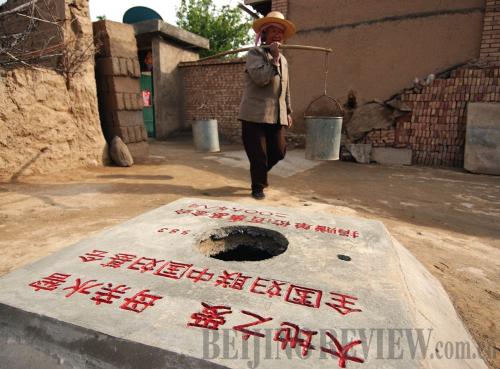|
 |
|
WATER SOURCE: A villager in Jianying Village in Yuzhong County, Gansu Province, comes to a water cellar in front of her home (NIE JIANJIANG) |
Ma Lanhua lives in Liyanzi Village in Tongxin County, northwest China's Ningxia Hui Autonomous Region. Her hometown is in a semi-arid area, so local residents drink rainwater stored in water cellars.
The cellar in Ma's home was built under the Mother's Water Cellar Program, which aims to improve water supplies in the area.
The All-China Women's Federation and the China Women's Development Fund launched the charity program in 2000.
So far, more than 120,000 water cellars and 1,300 water supply facilities have been built under the program, benefiting more than 1.7 million rural residents in west China.
In recent years, the program has been improved. It aims to give farmers access to clean, drinkable water. Cellar owners are also provided with equipment for purifying rainwater.
Since she got a free water purifier last July from the program, Ma has faithfully followed a routine.
Once every two days, she fills up the purifier with 20 kg of water taken from a hole dug to collect rainwater in her home. Then she watches TV and goes to sleep. The next morning, the whole family will have clean water to use for the next two days.
Statistics from the Ningxia Federation of Women show, from 2008 to now, more than 1,500 rainwater purifiers have been provided to farmers in the region through the program.
"The purifiers can remove contaminants and particles in rainwater, protecting people from diseases," said Chen Mei, an official with the federation.
Although China's total water resources are relatively abundant, its per-capita water availability is only about one fourth of the world average.
Many villages in west China, especially mountainous villages, are short of water primarily because of the monsoon climate and topographic features.
Monsoons blow in from China's eastern coast in summer, dumping rain there. The wind gets less humid as it goes inland. The monsoon climate makes China's water distribution uneven both spatially and regionally.
In the most arid Dingxi County in Gansu Province, some even say water is so rare many people only bathe three times in their lives: at birth, before a wedding and at death.
With an average annual precipitation of about 300 mm and evaporation of 1,500-2,000 mm, Dangtu Village in Dongxiang County, Gansu, is also a dry place.
Villagers used to travel more than 10 km along bumpy mountain roads to fetch water from the Liujiaxia Reservoir on the Yellow River.
For three decades, a local villager allegedly had walked for several hours a day, carrying water back.
Local farmers traditionally dug mud water cellars to store rainwater, but not much water could be stored due to runoff and seepage.
After a severe draught in 1995, the Gansu Provincial Government launched the 121 Rainwater Collection Program. Every household was advised to have a 100-square-meter rainwater-collection area, including roof and yard; build two cellars, each about 30 cubic meters in size, and cultivate about 667 square meters of land to be irrigated with rainwater stored in the cellar.
The cellar's bottom and wall are paved with cement to prevent water percolation. The ground surrounding the cellar is also paved and sloped so that water will flow into the cellar. The provincial government supplies the cement needed to build cellars.
Local officials said, for 300 mm of precipitation, an area of 100 square meters can collect about 20 tons of water. That should be sufficient for a family.
One year after the program's launch, 520,000 cellars were built in Gansu, giving 1.31 million people and 1.19 million livestock access to water, according to the Gansu Provincial Water Conservancy Department.
Despite this, the water shortage remained severe. For example, about 20 percent of Dongxiang's population still did not have easy access to drinking water.
The Mother's Water Cellar Program gives additional support to people to build cellars. On average, the program provides 1,000 yuan ($150) for each cellar, which is built by farmers themselves; the local government also provide financial support, which usually equals half the cost of a cellar, said Qin Guoying, Secretary General of the China Women's Development Fund.
Now residents of Dangtu Village no longer need to fetch water from the reservoir, people also used water to feed sheep and grow vegetables and flowers, said villager Wang Jianli.
More cellars have been built to irrigate the farmland. These rainwater collectors have enhanced crop yields by more than 40 percent, enabling farmers to diversify their crop portfolios and increase income. They have also helped reduce soil erosion as well as protected natural habitats, according to the Gansu Provincial Water Conservancy Department.
In addition to building cellars, in mountainous areas close to the Yellow River such as Huining County and Jingyuan County in Gansu, reservoirs have been built in the mountains, and water is pumped from the river to reservoirs.
Water can be pumped to a height of 650 meters, and then people in the mountain have water to drink and irrigate their crops. | 